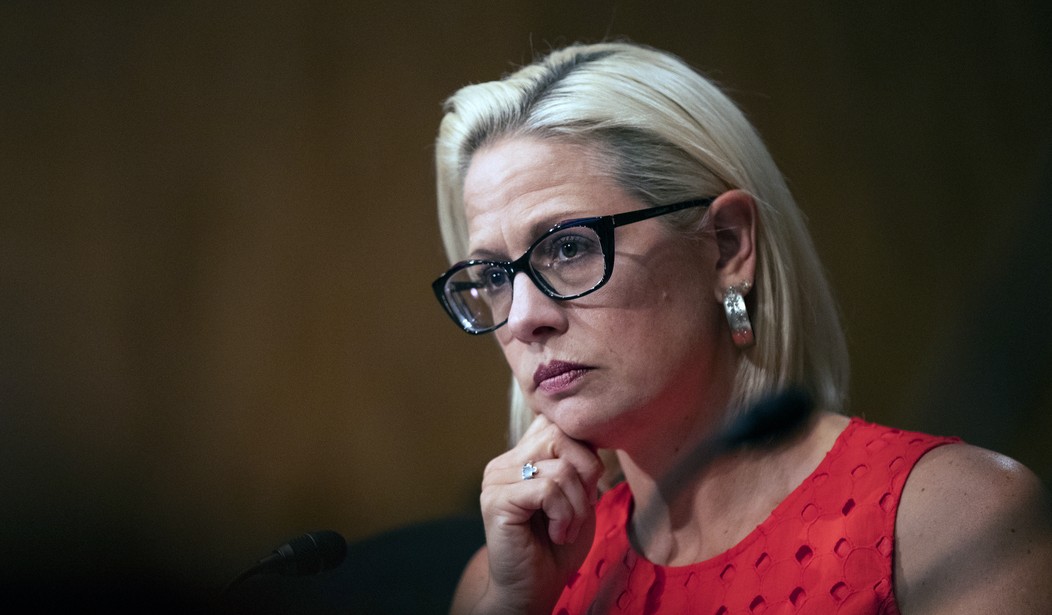A small, bipartisan group of Senate moderates has reached a deal on infrastructure funding that meets several goals set by Joe Biden and crosses few red lines set down by Republicans. Taxes would not be raised and the spending would be spread out over at least five years.
But getting Biden and Senate Minority Leader Mitch McConnell to sign off on the proposed legislation is a long shot.
At bottom, it depends on how badly the Democrats want a deal and how determined the Republicans are to stand in the way. For Biden, the deal doesn’t solve his problems with his radical base, which wants a much larger package with more social engineering spending. For McConnell, his base doesn’t want to give Biden anything that resembles a victory.
The bill itself calls for $579 in “new” government spending and an unspecified amount stolen from other Covid relief funds. The package would total $974 billion over five years and $1.2 trillion if the spending is authorized over eight years.
“We are discussing our approach with our respective colleagues, and the White House, and remain optimistic that this can lay the groundwork to garner broad support from both parties and meet America’s infrastructure needs,” said the group, which includes Sens. Kyrsten Sinema, Democrat of Arizona, Rob Portman, Republican of Ohio, and Joe Manchin, Democrat of West Virginia.
“Questions need to be addressed, particularly around the details of both policy and pay fors, among other matters. Senior White House staff and the Jobs Cabinet will work with the Senate group in the days ahead to get answers to those questions, as we also consult with other Members in both the House and the Senate on the path forward,” the spokesman said in a statement.
The group has been tight-lipped about how it would pay for the package. There are some indications that the group was discussing indexing the gas tax to inflation and some kind of electric vehicle mileage tax, but both of those ideas may be non-starters with Biden.
The new proposal is also expected to be paid for in part by repurposing funds from previous Covid-aid packages, said Sen. Shelley Moore Capito (R., W.Va.), who led the last round of negotiations with Mr. Biden and has spoken with members of the bipartisan group.
Mr. Biden last week indicated he would be open to using about $75 billion of Covid aid passed during the Trump administration, but administration officials said he wouldn’t siphon any funds from the $1.9 trillion Covid-19 relief package passed earlier this year.
About four trillion dollars in pandemic relief has been authorized and while much of the spending has gone to stimulus checks, small business loans, and pandemic health care needs, there is a lot of that money — hundreds of billions of dollars — that hasn’t been spent yet. No doubt, Democrats will find a way to put the cash in someone’s pocket at a later date, but instead of giving it to favored interest groups, why not put it where it will do the most good — rebuilding roads and bridges?
In addition to the ten votes from the moderates, the group will need 50 additional Senate votes to get the package on to the floor for debate. That doesn’t appear likely given reluctant Republicans and angry Democrats who are losing patience with Biden. They believe he’s coddling the Republicans and spending too much time trying to get them to agree to a deal.
“Time is running out for the administration to get big, significant things done,” said former Housing and Urban Development Secretary Julián Castro. “Infrastructure deserves attention, but they need to be putting their energy and their attention more on voting rights right now than I believe they are.”
The increasingly anxious split underlines competing worldviews in a party defending narrow majorities in the midterm elections. On one side are Democrats mostly determined to empower people of color and women by protecting the vote and delivering on a broad suite of promises. On the other are those who want to cement ties to suburban moderates with an emphasis on the economy and pragmatic achievements.
“The president made getting covid under control and getting the economy moving again his top priorities,” said Anita Dunn, a senior White House adviser. “That is what he has been focused on.” Dunn added that the White House has moved forward on other issues at the same time.
Time and circumstances have passed the moderates by — including Biden. What would have been seen even a decade ago as a noble effort is now viewed by most on the Hill as a waste of time. No one wants to compromise or think about getting along.
It will take a leader with a lot more respect on both sides than Joe Biden to change that.










Join the conversation as a VIP Member